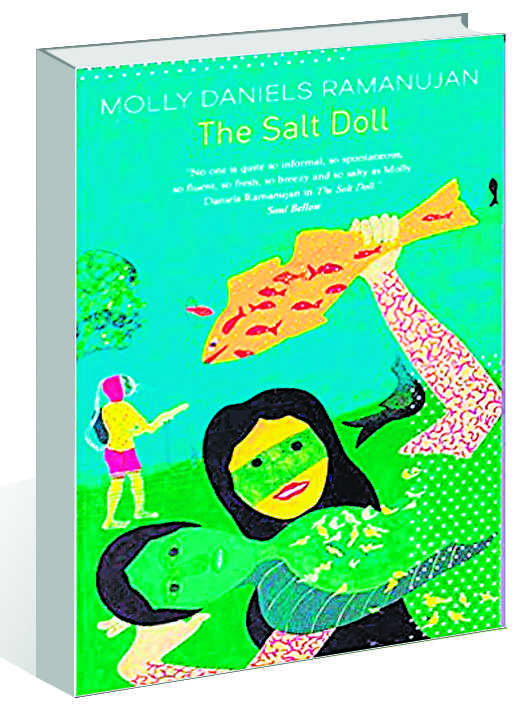
The Salt Doll by Molly Daniels Ramanujan.
Rumina Sethi
The Salt Doll is the story of Mira Cheriyan. Taken to Aden to live with her parents, she rebels against them, tries to run away, and is finally sent to school in India. But this iconoclast cannot adapt to the disciplining environment of a single school: “At the first boarding school, the nuns wanted us to be truthful. If we told lies, they powdered quinine and rubbed it on our tongues.”
She encounters various disasters in the nine boarding schools she changes: their strictures “did not bother anyone else at the school, but it did me”. Reading thereby turns “into a crusade, a declaration of independence” and provokes her to venture into the forbidden.
Rejected by the world, Mira is mostly brought up by her grandfather, the only real parent she has known since she has been abandoned by her mother at the age of four. But she secretly begins to enjoy the freedom of being a cast-out: “If you have no parents, you have freedom.” Ordered to read only the literature approved by the Mother Superior in one of her schools, she begins to hate impositions, and protests repeatedly, sometimes even hoaxing high fever to escape “from the world we suddenly found impossible to accept.”
Finally, it is in the dark attic of her grandparents’ house that she discovers real privacy and the erotic secrets of her body through an act of incest, which eventually becomes an enabling factor of her lifelong search for freedom. To her, “recognition of nuances is interior” and “it is not the half-done but the half-suggested that is the source of alchemy.” This is how Mira Cheriyan comes across to the reader, both in her compassion and her intensity, with a deep awakening at an early age — that “to touch truly” is to experience life in its true innocence and depth.
Correspondingly, the dance movement of the novel works through events and characters that coalesce and part while the literary tensions between relations and races remain vividly in the background. Various accounts of child misconduct, of antipathy towards the parents, of ceremonies and rituals across cultures, are replete with the instinctual and the savage. Molly Daniels’s art of storytelling finds a reflection in the novel’s kaleidoscopic depiction of behaviour, sexual responses and the literary imagination through a technique of merging the concrete and the intangible.
The Salt Doll, a reprint, is dedicated to her husband, the well-known poet, A. K. Ramanujan, under whose shadow the unfortunate Daniels spent most of her life. This is a remarkable but forgotten book, that is almost a palimpsest of Arundhati Roy’s God of Small Things — so similar is the ambience.
Daniels, who died three years ago, was an author of no mean stature. She wrote three novels and several books on criticism, and also founded the Clothesline School of Writing in Chicago with many distinguished writers among her students.
Molly Daniels claims that the “clothesline method” involves no separation between “work and play, innocence and experience”. No surprise that the quintessence of the book lies in the proclamation: “A doll made of salt goes to experience the sea; immersed, she becomes the sea and cannot return to tell you anything.” The symbolic connotations of “the salt doll” anticipates an intense involvement in the event to the extent of depersonalization of the self. But Mira returns from the immersion, and when it comes to creating a written account of the action, the cerebral overwhelms the emotional.
Giving a graphic and very detailed description of her experience of childbirth, she who is an inveterate fainter, ends up giving an objective account, transcending the corporeal. Mira realises, “To be born is to feel, and to feel is to know.”
The mind’s triumph over events, visible in Daniels’s rich and powerful account of Cheriyan and the characters around her, is her celebration of imagination. And if you celebrate imagination, you affirm art; and if you affirm art, you affirm life.


























